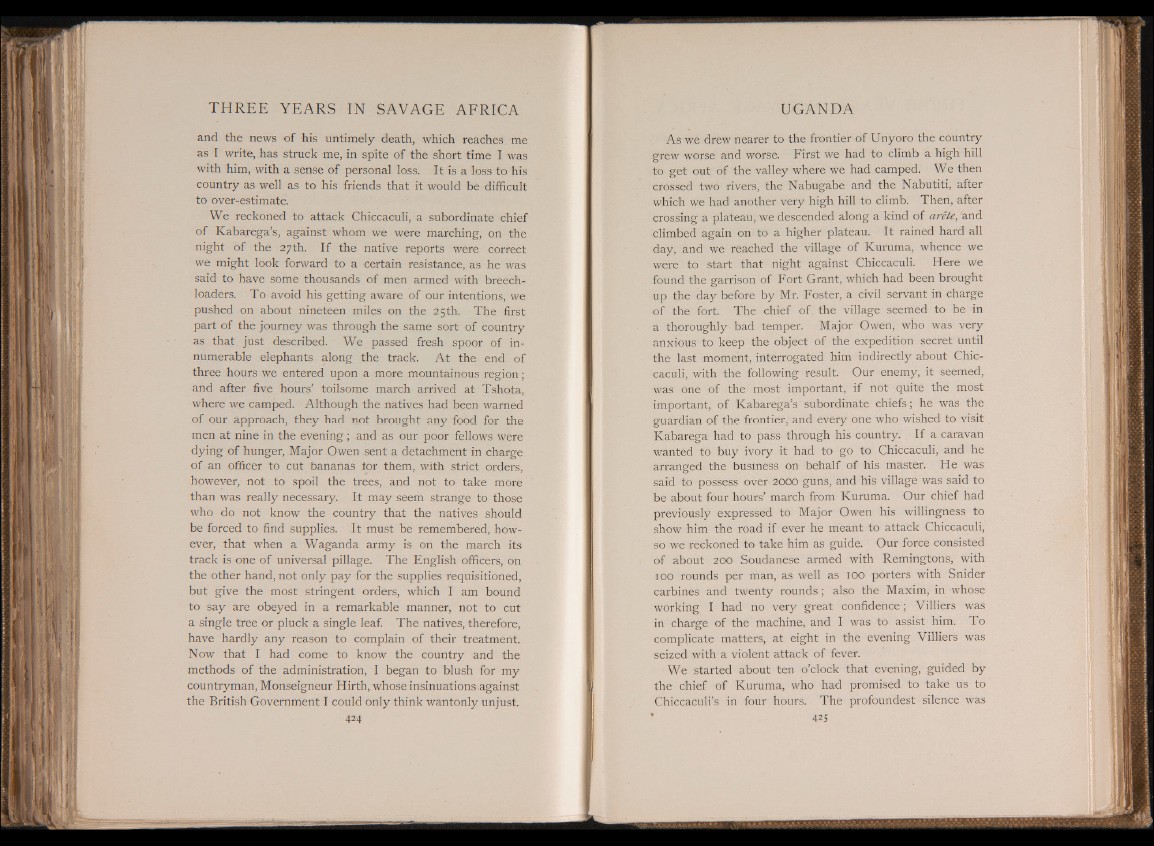
and the news of his untimely death, which reaches me
as I write, has struck me, in spite of the short time I was
with him, with a sense of personal loss. It is a loss to his
country as well as to his friends that it would be difficult
to over-estimate.
We reckoned to attack Chiccaculi, a subordinate chief
of Kabarega’s, against whom we were marching, on the
night of the 27th. If the native reports were correct
we might look forward to a certain resistance, as he was
said to have some thousands of men armed with breechloaders.
To avoid his getting aware of our intentions, we
pushed on about nineteen miles on the 25th. The first
part of the journey was through the same sort of country
as that just described. We passed fresh spoor of innumerable
elephants along the track. At the end of
three hours we entered upon a more mountainous region;
and after five hours’ toilsome march arrived at Tshota,
where we camped. Although the natives had been warned
of our approach, they had not brought any food for the
men at nine in the evening; and as our poor fellows were
dying of hunger, Major Owen sent a detachment in charge
of an officer to cut bananas for them, with strict orders,
however, not to spoil the trees, and not to take more
than was really necessary. It may seem strange to those
who do not know the country that the natives should
be forced to find supplies. It must be remembered, however,
that when a Waganda army is on the march its
track is one of universal pillage. The English officers, on
the other hand, not only pay for the supplies requisitioned,
but give the most stringent orders, which I am bound
to say are obeyed in a remarkable manner, not to cut
a single tree or pluck a single leaf. The natives, therefore,
have hardly any reason to complain of their treatment.
Now that I had come to know the country and the
methods of the administration, I began to blush for my
countiyman, Monseigneur Hirth, whose insinuations against
the British Government I could only think wantonly unjust.
424
As we drew nearer to the frontier of Unyoro the country
grew worse and worse. First we had to climb a high hill
to get out of the valley where we had camped. We then
crossed two rivers, the Nabugabe and the Nabutiti, after
which we had another very high hill to climb. Then, after
crossing a plateau, we descended along a kind of arête, "and
climbed again on to a higher plateau. It rained hard all
day, and we reached the village of Kuruma, whence we
were to start that night against Chiccaculi. Here we
found the garrison of Fort Grant, which had been brought
up the day before by Mr. Foster, a civil servant in charge
of the fort. The chief of the village seemed to be in
a thoroughly bad temper. Major Owen, who was very
anxious to keep the object of the expedition secret until
the last moment, interrogated him indirectly about Chiccaculi,
with the following result. Our enemy, it seemed,
was one of the most important, if not quite the most
important, of Kabarega’s subordinate chiefs; he was the
guardian of the frontier, and every one who wished to visit
Kabarega had to pass through his country. If a caravan
wanted to buy ivory it had to go to Chiccaculi, and he
arranged the business on behalf of his master. He was
said to possess over 2000 guns, and his village was said to
be about four hours’ march from Kuruma. Our chief had
previously expressed to Major Owen his willingness to
show him the road if ever he meant to attack Chiccaculi,
so we reckoned to take him as guide. Our force consisted
of about 200 Soudanese armed with Remingtons, with
100 rounds per man, as well as 100 porters with Snider
carbines and twenty rounds ; also the Maxim, in whose
working I had no very great confidence ; Villiers was
in charge of the machine, and I was to assist him. To
complicate matters, at eight in the evening Villiers was
seized with a violent attack of fever.
We started about ten o’clock that evening, guided by
the chief of Kuruma, who had promised to take us to
Chiccaculi’s in four hours. The profoundest silence was